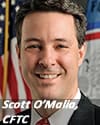Greater use of data and a focus on the impact of high-frequency trading (HFT) are key to the Commodity Futures Trading Commission’s (CFTC) approach to new automated trading rules, one of its commissioners has said.
Answering questions yesterday at a conference hosted by the Investment Company Institute (ICI) about the CFTC’s concept release on automating trading, Scott O’Malia called for industry input, including from the buy-side, in the development of new standards.
He singled out proper understanding of high-frequency activity as key to new rules.
“Unpacking the HFT and automated trading environment is critical. We need to look at the data to look at what can go wrong and what the remedies are,” he said.
O’Malia added that learning lessons from the equities market, where high-profile events such as the 2010 flash crash have exposed the vulnerability of markets to automated trading errors, was also vital.
The formulation of draft rules around automated trading would sit around three core areas, O’Malia explained. The first would involve a comprehensive survey of market risk controls to identify the most effective. The second area would focus on which exchange rules are most appropriate for the CFTC to adopt based on industry best practice. The third area would be to decide whether a registration process for firms engaged in automated trading would be suitable for new rules.
“Should automated traders be registered? Do you want to distinguish between high-frequency trading and all automated trading schemes? [Because] not all automated trading is high-frequency,” he said.
He called upon the industry to respond to the concept release by the mid-December deadline for comment.
O’Malia, who chairs the CFTC advisory committee on technology, added the Commission needed stronger powers to monitor markets as they develop in complexity.
“We’re twentieth century regulator in the twenty-first century market and it’s not acceptable to me and I don’t think it should be acceptable to anybody else who invests in the market,” he said.
“We need to upgrade our technology so we can really see into the markets on a more real-time basis,” he said, adding the Commission needed to look at order flow, not just transaction data, which Congress has already set aside funds to do.
